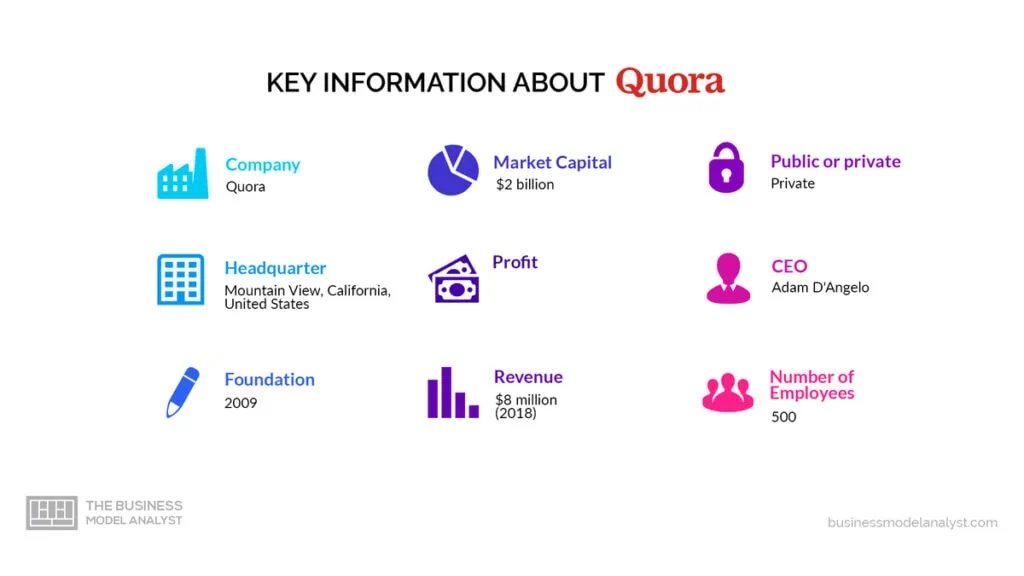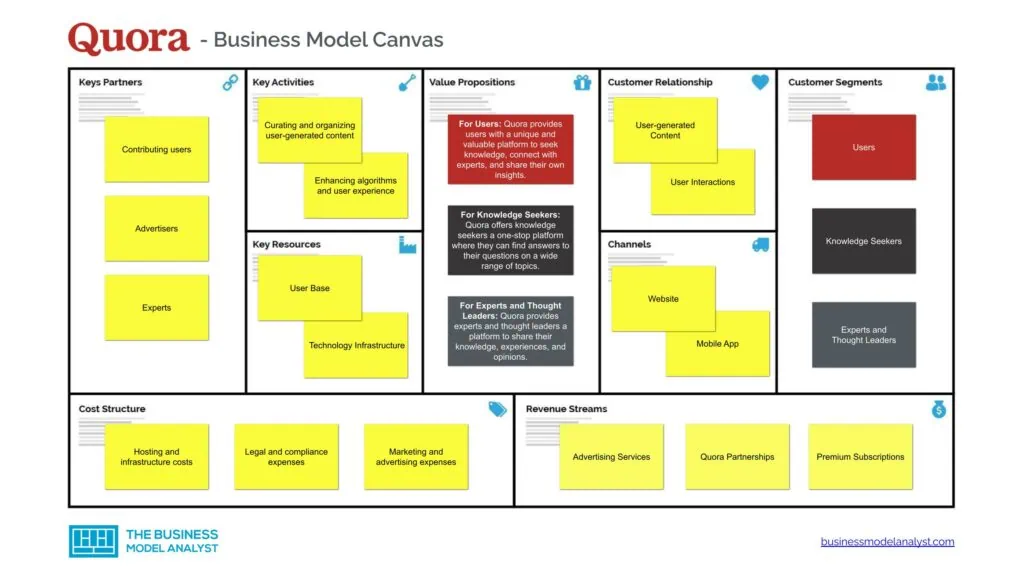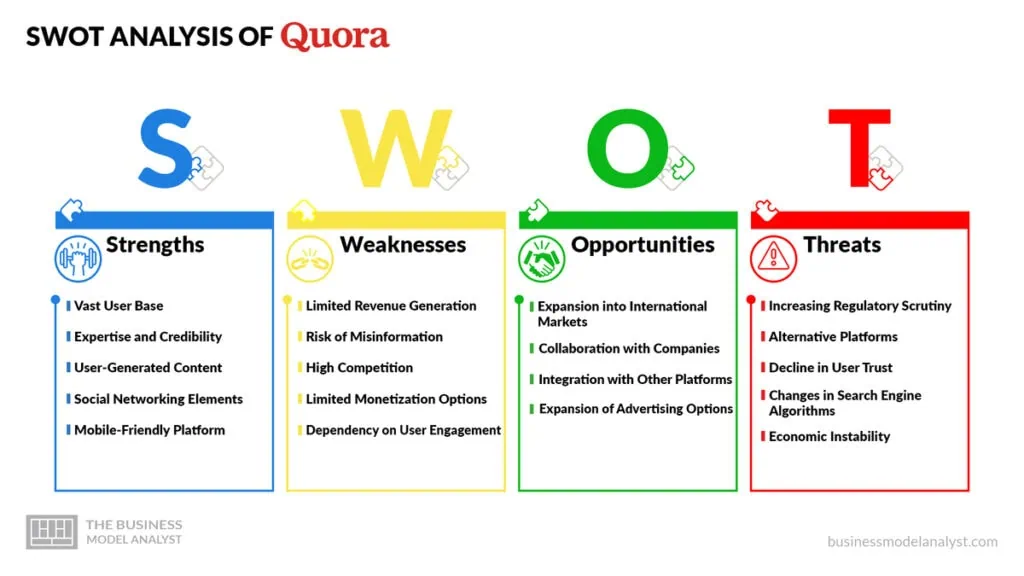The Quora Business Model revolves around creating a platform where users can ask questions, share knowledge, and engage in discussion with a global community. Launched in 2010, Quora has become a popular online destination for individuals seeking information on various topics.
On Quora, users can post questions and receive answers from experts and individuals with relevant knowledge. Users can also follow topics and other users to personalize their feeds and receive updates on the content they are interested in. Quora encourages users to provide thoughtful and informative answers by prioritizing high-quality content through its moderation system.
With millions of active users, Quora has established itself as a valuable resource for individuals seeking reliable information and insights. Quora has created a space where users can connect and learn from each other by fostering a sense of community and providing a platform for knowledge sharing.
We will be looking into the details of the Quora Business Model, exploring its core features, revenue generation strategies, and its impact on users and the larger online community, as well as examining its strengths and potential challenges.

Contents
A brief history of Quora
Quora was founded in June 2009 by former Facebook employees Adam D’Angelo and Charlie Cheever. The idea for Quora stemmed from their desire to create a platform where people could share their knowledge and expertise, as well as engage in meaningful discussions.
D’Angelo and Cheever believed traditional search engines often lacked accurate and trusted information, mainly relying on algorithms and automated results. They wanted to build a platform that would harness the power of human knowledge and curate high-quality answers to users’ questions.
In its early days, Quora operated in a closed beta mode, accessible only to a limited number of invited users. This exclusivity helped create a sense of community and fostered the growth of Quora’s user base.
As Quora gained popularity and garnered positive user feedback, the platform opened its doors to the public in 2010. This move allowed a broader audience to join and contribute to the growing knowledge-sharing community.
Quora’s success can be attributed to its unique content moderation and quality control approach. The platform employs machine learning algorithms and human moderators to ensure that answers are relevant, reliable, and spam-free. This commitment to maintaining a high content standard has helped Quora build user trust.
Over the years, Quora has continued to evolve and refine its features to enhance the user experience. The platform introduced the concept of topics, allowing users to follow and contribute to discussions in their areas of interest. Quora also implemented a system of upvotes and downvotes, enabling users to signal the quality of answers and enhance the visibility of valuable content.
Quora’s business model revolves around advertising and partnerships. As the platform grew in popularity, it attracted the attention of advertisers who saw the potential to reach a highly engaged and knowledgeable user base. Businesses now have the opportunity to promote their products and services through targeted advertising on Quora.
In addition to advertising, Quora has also formed partnerships with organizations to provide sponsored content and promoted answers. This allows businesses and experts to showcase their expertise and establish themselves as thought leaders within their respective industries.
In recent years, Quora has continued to grow and adapt to changes in the digital landscape. The platform has expanded its reach globally, attracting users worldwide and offering content in multiple languages. Quora has also invested in machine learning and artificial intelligence to improve the user experience, with features like personalized recommendations and question clustering.
As of today, Quora remains a prominent player in the online knowledge-sharing space, with millions of users actively engaging with the platform daily. Its unique blend of expertise, community, and quality content has solidified its position as a go-to resource for individuals seeking reliable answers and insights from diverse contributors.
Who Owns Quora
Quora is a privately held company with a diverse ownership structure. The founders, Adam D’Angelo and Charlie Cheever, were instrumental in establishing Quora and continue to own a significant portion of the company. Although Charlie Cheever left the company in 2012, he may still hold a substantial ownership stake in Quora.
In addition, Quora has attracted investments from several prominent venture capital firms and investors, including Benchmark, Tiger Global, Collaborative Fund, YC, Peter Thiel, Matrix Partners, Keith Rabois, Andreessen Horowitz, and many others. These investors have provided crucial financial support and expertise to Quora’s growth and development.
Quora’s employees also have ownership in the company through its incentive stock option plan, aligning their incentives with the business’s long-term success.
Quora Mission Statement
Quora’s mission statement is “to share and grow the world’s knowledge.”

How Quora works
Quora is a community-based question-and-answer platform that allows users to ask questions on various topics and receive answers from experts and other knowledgeable individuals.
Quora’s business model revolves around connecting users with information and expertise in a seamless and accessible way. The platform brings together a diverse community of users who share their knowledge and insights by answering questions posted by others.
To use Quora, users first create a free account on the platform. They can then browse a wide range of topics or search for specific questions. If a question has not already been asked, users can submit their own questions and wait for others to provide answers.
Quora leverages its algorithm and technology to prominently display the most relevant and authoritative answers. The platform has a voting system, where users can upvote or downvote answers based on their quality. This helps to surface the best answers and ensures that users receive accurate and helpful information.
One unique aspect of Quora is the ability for users to follow specific topics, users, or questions. Following topics, users can receive updates and notifications whenever new questions or answers are related to their interests. Users can also follow specific users who consistently provide valuable insights and expertise.
Quora also offers features and services to enhance the user experience, such as:
- Quora Spaces: Spaces allow users to create and participate in communities based on specific topics or interests. This provides a dedicated space for users to discuss and share their knowledge within a particular niche;
- Quora Blogs: Users can create and publish their own blog posts on Quora. This feature allows users to share longer-form content, such as articles or thought pieces, and showcase their expertise more comprehensively;
- Quora Digest: Quora sends regular emails to users with personalized recommendations for questions, topics, and answers that may interest them. This helps users stay informed and engaged with the platform by receiving curated content tailored to their preferences.
Quora’s business model relies on a combination of user-generated content, targeted advertising, and partnerships to generate revenue.
How Quora makes money
Quora, a popular question-and-answer platform, operates a diverse business model to generate income. While the platform is free, Quora has implemented several strategies to monetize its services. The following are the primary ways Quora makes money:
Advertising Services
Quora leverages its massive user base, with millions of users actively engaging with the platform, to attract advertisers. Companies and brands pay Quora to advertise their products and services to the platform’s users. Quora employs various types of ads to effectively reach its target audience:
- Sponsored Questions: Similar to promoted ads on other platforms, sponsored questions appear in users’ feeds and are marked as “sponsored.” These questions are strategically targeted based on users’ interests, ensuring relevant exposure for advertisers;
- Display Ads: Quora incorporates display ads on the platform’s web pages and mobile app. These ads are designed to seamlessly blend into the overall user experience, providing a non-intrusive advertising approach;
- Business Profiles: Quora allows businesses to create and promote their profiles, enabling them to engage with users and showcase their expertise. This feature allows companies to establish credibility and gain visibility to potential customers.
The revenue generated from advertising services is a significant source of income for Quora.
Quora Partnerships
Quora forms strategic partnerships with organizations and companies to provide valuable insights and data-driven solutions. These partnerships involve data licensing, where Quora’s extensive question-and-answer database and aggregated and anonymized user data are made available to partners for research and market analysis purposes.
The data provided by Quora can help partners gain valuable consumer insights, understand market trends, and make informed business decisions. This mutually beneficial data exchange generates revenue for Quora;
Premium Subscriptions
Quora has introduced premium subscription services to offer users enhanced features and exclusive access. Quora’s premium subscribers pay a monthly or annual fee to unlock additional benefits, including:
- Ad-Free Experience: Premium subscribers enjoy an ad-free browsing experience, eliminating distractions and allowing them to focus solely on the content;
- Advanced Features: Quora’s premium subscribers gain access to advanced features that enhance their platform usage. These features may include personalized recommendations, improved search functionality, and priority customer support.
The revenue generated from premium subscriptions adds to Quora’s overall business model.
Quora Business Model Canvas
The Quora Business Model can be explained in the following business model canvas:

Quora Customer Segments
Quora’s services are available to individuals worldwide, making its customer segment diverse and far-reaching. Quora’s customer segment consists of the following:
- Users: Users on Quora are the primary customer segment, as they are the ones who create content, ask and answer questions, and engage with the platform. Quora boasts a large user base, with millions of active users worldwide. Users join Quora to seek knowledge, share expertise, and connect with like-minded individuals. Individuals from various backgrounds use the platform, including students, professionals, experts, and enthusiasts. Users on Quora can create personal profiles, contribute to discussions, follow topics, and engage with others’ content. They play a crucial role in the success of Quora’s business model;
- Knowledge Seekers: Within the user segment, there is a subsegment called knowledge seekers. These individuals specifically visit Quora to find answers to their questions and gain insights from experts in various fields. Knowledge seekers are attracted to Quora’s vast repository of user-generated content and the ability to access expertise on a wide range of topics. Quora serves as a valuable resource for students, researchers, professionals, and curious individuals seeking information and perspectives;
- Experts and Thought Leaders: Another subset of the user segment comprises experts and thought leaders who actively share their knowledge and opinions on Quora. These individuals contribute to the platform by providing in-depth answers, sharing personal experiences, and offering unique insights. Experts and thought leaders value Quora as a platform to showcase their expertise, build their personal brand, and engage with a global audience. Their contributions enhance the overall knowledge ecosystem on Quora;
- Advertisers: Advertisers form a critical customer segment for Quora’s revenue generation. Quora offers advertising solutions that allow businesses to reach and engage with its vast user base. Advertisers on Quora can target specific topics, demographics, and interests to promote their products or services. They leverage Quora’s platform to raise brand awareness, drive website traffic, and generate leads. The ability to target a highly engaged and knowledgeable audience makes Quora an attractive advertising platform for businesses;
- Data Partners: Quora also collaborates with data partners interested in buying aggregated and anonymized user data. These partnerships facilitate the monetization of Quora’s data while maintaining user privacy. Data partners gain insights from user behavior and preferences, enabling them to make data-driven decisions and improve their products or services.
Quora Value Propositions
Quora offers the following value propositions to its users:
- For Users: Quora provides users with a unique and valuable platform to seek knowledge, connect with experts, and share their own insights. They can access a vast repository of user-generated content, ask questions on any topic, and receive answers from knowledgeable individuals. Quora’s value proposition lies in connecting users with relevant and trustworthy information, fostering learning, and promoting meaningful discussions. Users benefit from the opportunity to expand their knowledge, gain insights from different perspectives, and build connections with a global community of like-minded individuals;
- For Knowledge Seekers: Quora offers knowledge seekers a one-stop platform where they can find answers to their questions on a wide range of topics. They can tap into the expertise of individuals from various fields, access personal experiences, and gain valuable insights. Quora’s value proposition to knowledge seekers lies in its ability to provide a diverse and comprehensive knowledge base, enabling them to expand their understanding, solve problems, and make informed decisions. They can explore different viewpoints, learn from experts, and discover new information relevant to their interests and needs;
- For Experts and Thought Leaders: Quora provides experts and thought leaders a platform to share their knowledge, experiences, and opinions. They can establish themselves as authority figures within their respective fields, build their personal brand, and connect with a global audience. Quora’s value proposition to experts lies in its ability to showcase its expertise, increase its visibility, and engage with a community of individuals seeking knowledge. They can contribute to discussions, provide in-depth answers, and have their insights recognized and appreciated by a diverse and intellectually curious audience;
- For Advertisers: Quora offers advertisers a unique opportunity to reach a highly engaged and knowledgeable audience. They can promote their products or services to users actively seeking information and insights on relevant topics. Quora’s value proposition to advertisers lies in its ability to provide targeted advertising solutions, allowing it to reach specific demographics, interests, and topics. Advertisers can raise brand awareness, drive website traffic, and generate leads through display ads, promoted answers, and other advertising formats. They benefit from the ability to connect with a receptive audience and align their brand with trusted and authoritative content;
- For Data Partners: Quora collaborates with data partners to provide aggregated and anonymized user data. They can gain insights into user behavior, preferences, and trends, enabling them to make data-driven decisions and improve their products or services. Quora’s value proposition to data partners lies in its ability to offer valuable and actionable data that helps them understand their target audience better. By leveraging Quora’s data, they can enhance personalization, optimize marketing strategies, and deliver more relevant and impactful user experiences.
Quora Channels
Quora utilizes the following channels to reach its audience:
- Website: Quora primarily operates through its website, which serves as the main channel for users to access and contribute to the platform;
- Mobile App: Quora has a mobile application available for both iOS and Android devices, allowing users to access the platform conveniently on their smartphones;
- Email Notifications: Quora uses email notifications to engage users and notify them about new answers, questions, and content that may be of interest to them;
- Integration with Social Media: Quora integrates with social media platforms such as Facebook and Twitter, enabling users to share their Quora activity and discover questions or answers through their social networks;
- Search Engine Optimization (SEO): Quora optimizes its content for search engines, ranking its questions and answers highly in search results and attracting users looking for specific information.
Quora Customer Relationships
Quora customer relationships consist of:
- User-generated Content: Quora relies on its users to contribute and generate high-quality content, which creates a sense of community and engagement;
- User Interactions: Quora encourages users to interact with each other by following topics, upvoting answers, commenting, and collaborating on edits to ensure the accuracy and relevance of content;
- User Support: Quora offers support services to address user queries, concerns, and technical issues through its Help Center and community forums;
- Community Moderation: Quora relies on user-generated moderation, where trusted users can edit, remove, or flag inappropriate content, ensuring the platform remains reliable and trustworthy.
Quora Revenue Streams
Quora generates revenue through the following channels:
- Advertising Services
- Quora Partnerships
- Premium Subscriptions
Quora Key Resources
Quora relies on the following key resources to operate effectively:
- User Base: Quora’s most valuable resource is its large and active user base, which contributes to the platform’s content and drives engagement;
- Technology Infrastructure: Quora requires robust technology infrastructure to support its website and mobile app, as well as to ensure its features and functionalities are operational;
- Algorithms and Machine Learning: Quora utilizes algorithms and machine learning to suggest relevant questions, answers, topics, and ads to its users, providing a personalized and tailored experience;
- Partnerships: Quora may form partnerships with businesses, publishers, and experts to enhance the platform’s content and credibility, while also exploring potential revenue streams;
- Brand and Reputation: Quora’s brand and reputation play a crucial role in attracting and retaining users, as it is seen as a reliable and trustworthy platform for sharing knowledge and seeking expertise.
Quora Key Activities
Quora engages in the following key activities to deliver its services:
- Curating and organizing user-generated content
- Enhancing algorithms and user experience
- Driving user engagement
- Moderating and enforcing guidelines
- Partnering with experts and influencers
- Marketing and promoting the platform
- Analyzing data for insights
- Developing and maintaining mobile apps
Quora Key Partners
Quora collaborates with the following key partners to enhance its offerings:
- Contributing users
- Advertisers
- Experts
- Investors
- Academic institutions and research organizations
- Content creators and publishers
Quora Cost Structure
Quora incurs the following costs to sustain its operations:
- Hosting and infrastructure costs
- Legal and compliance expenses
- Marketing and advertising expenses
- Research and development costs
- Data analysis and machine learning expenses
- Moderation and community management costs
- Partnerships and collaborations
- Administrative and overhead expenses
- Customer support costs
Quora Competitors
- Reddit: Reddit is a social media platform that allows users to submit and discuss content on various topics. While Reddit and Quora share similarities, such as their question-and-answer format, Reddit tends to have a more diverse range of communities and a stronger focus on user-generated content;
- Stack Exchange: Stack Exchange is a question-and-answer website network covering specific knowledge areas. Sites like Stack Overflow (for coding and programming) and Server Fault (for IT professionals) cater to a more specialized audience compared to Quora, which covers a broader range of topics;
- Medium: Medium is a blogging platform that allows users to share their insights and opinions on various topics. While it is not primarily focused on question-and-answer interactions, Medium competes with platforms like Quora in terms of offering a space for knowledge sharing and building a community around specific subjects;
- Google: While not a direct competitor, Google can also be seen as a competitor to Quora. Google’s search engine provides users with instant access to answers and information. When users search for specific questions, Google aims to provide the most relevant and accurate sources, potentially reducing the need for users to seek answers on platforms like Quora;
- Facebook Groups: Facebook Groups offer a platform for users to create and join communities centered around specific interests, including Q&A discussions. While not exclusively focused on Q&A, Facebook Groups compete with Quora by providing users with a social environment to ask questions, seek advice, and connect with like-minded individuals;
- X (Twitter): Twitter’s real-time nature allows users to ask questions and seek answers from their followers and the wider Twitter community. While Twitter is not primarily a Q&A platform, its broad reach and ability to engage in conversations create competition for Quora regarding quick information sharing and crowdsourced responses;
- Ask.fm: Ask.fm is a question-and-answer platform focusing on social interactions. Users can ask questions anonymously or publicly, and others can answer them. While Ask.fm differs in several aspects from Quora’s model, it competes in providing a platform for users to seek answers and engage with a community.
Quora SWOT Analysis
SWOT analysis is a widely used strategic tool that helps businesses evaluate their internal strengths and weaknesses and identify external opportunities and threats. For Quora, conducting a SWOT analysis can provide valuable insights into its business model.
By examining the strengths, weaknesses, opportunities, and threats facing Quora, we can understand its position in the market and its challenges and opportunities. This analysis allows us to assess Quora’s growth, sustainability, and competitiveness potential in the rapidly evolving online information and social networking landscape.

Quora Strengths
- Vast User Base: Quora boasts a large and engaged user base, contributing to a diverse range of perspectives and knowledge on the platform;
- Expertise and Credibility: Quora has become a reputable source of information due to its emphasis on user expertise and the moderation system that helps maintain high-quality content;
- User-Generated Content: Quora’s strength lies in the vast amount of user-generated content, which allows for a wide range of topics and questions to be addressed;
- Social Networking Elements: Quora successfully integrates social networking elements, allowing users to follow topics, connect with experts, and engage in discussions;
- Mobile-Friendly Platform: Quora has a mobile application and a responsive website, enabling users to access the site easily on the go.
Quora Weaknesses
- Limited Revenue Generation: Quora relies heavily on venture funding and has yet to establish a significant revenue stream, leading to concerns about long-term sustainability;
- Risk of Misinformation: Despite moderation efforts, Quora remains susceptible to inaccuracies and biases in user-generated content, potentially damaging its credibility;
- High Competition: Quora faces stiff competition from other knowledge-sharing platforms, search engines, and social media networks, making it challenging to stand out amidst the competition;
- Limited Monetization Options: Quora’s business model heavily relies on advertising, which may deter users and negatively impact the overall user experience;
- Dependency on User Engagement: Quora’s success heavily relies on user engagement and active participation, which can fluctuate and impact the platform’s growth and sustainability.
Quora Opportunities
- Expansion into International Markets: Quora has the opportunity to tap into untapped international markets, providing localized content and increasing its user base further;
- Collaboration with Companies: Quora can explore partnerships and collaborations with companies to create branded content, sponsored expert answers, and in-depth knowledge resources;
- Integration with Other Platforms: Quora can explore integration with other popular online platforms to leverage its user bases and expand its reach and impact;
- Expansion of Advertising Options: Quora can enhance its advertising offerings by providing advanced targeting options and native advertising formats, attracting more advertisers.
Quora Threats
- Increasing Regulatory Scrutiny: As a content platform, Quora faces regulatory challenges, especially concerning privacy, data protection, and moderation of user-generated content;
- Alternative Platforms: Quora faces the threat of users shifting to alternative platforms that offer similar services or excel in specific niches;
- Decline in User Trust: Significant instances of misinformation, controversies, or a decline in user trust can negatively impact Quora’s reputation and user engagement;
- Changes in Search Engine Algorithms: Quora’s visibility and traffic heavily rely on search engine ranking, which can be affected by algorithm changes or increases in competition for relevant search queries;
- Economic Instability: Economic downturns or recessions may reduce advertising spending, affecting Quora’s revenue potential and financial stability.
Conclusion
Quora’s business model has been remarkably successful. By leveraging the power of user-generated content and creating a platform that fosters knowledge sharing, Quora has not only attracted a massive user base, but has also been able to monetize its platform effectively through targeted advertising and sponsored content.
In addition, Quora’s emphasis on expertise and credibility has established it as a trusted source of information, further driving user engagement and attracting top-tier contributors. Going forward, Quora’s continued focus on improving user experience, expanding its advertising offerings, and diversifying revenue streams will likely ensure its sustained success in the ever-evolving digital landscape.

